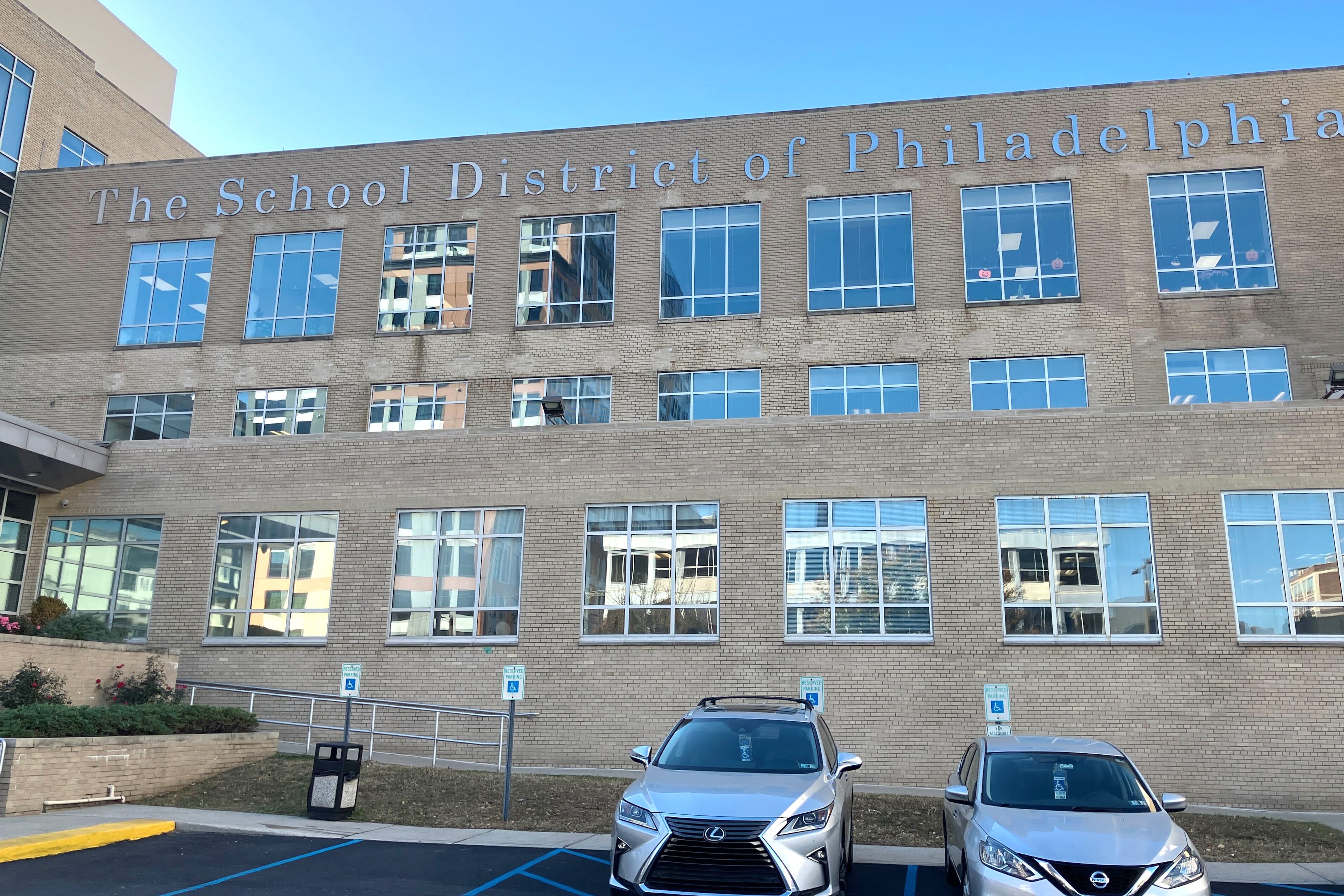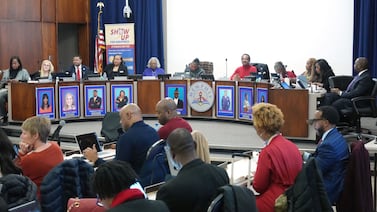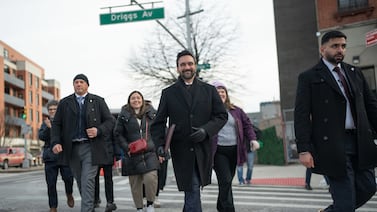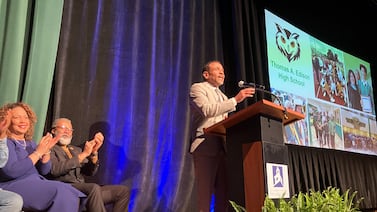Sign up for Chalkbeat Philadelphia’s free newsletter to keep up with the city’s public school system.
The Philadelphia Board of Education continues to approve controversial tax breaks that have cost the school district millions. But there are signs officials’ concerns about them are growing.
Despite worries about accountability and how much they have benefited district students, board members voted unanimously Thursday to approve 10-year extensions to tax breaks for two developers participating in the state’s Keystone Opportunity Zones.
The vote was held in a separate back room in the district’s headquarters after pro-Palestinian protesters shut down the board meeting to demand the district reinstate educator Keziah Ridgeway. Ridgeway was removed from her classroom by the district following a complaint from the Jewish Federation of Greater Philadelphia.
The KOZ program waives nearly all state and local taxes, including business and property taxes, for decades for nearly 300 underutilized plots of land across the city.
A Chalkbeat Philadelphia investigation revealed these zones siphon millions of much-needed funding away from the underfunded school district. In many cases they provide little benefit to students. Though these tax breaks represent a small share of the district’s $4.5 billion budget, declining enrollment and sunsetting COVID relief funds have district financial experts projecting escalating shortfalls.
The tax breaks have the support of Mayor Cherelle Parker and the state, Philadelphia Director of Commerce Alba Martinez told the board Thursday. Board members — all of whom were appointed or reappointed by Parker — have consistently declined Chalkbeat’s repeated requests for comment about why they continue to approve the tax breaks. They have directed all questions to the city’s Commerce Department.
“Board Members will not be available for an interview and we do not plan to issue a statement,” board spokesperson Logan Peterson said in an email response to Chalkbeat’s questions Thursday.
During Thursday’s meeting, board member Joan Stern did request a longitudinal study from the city or the developers outlining how the district is impacted financially by the tax breaks, and more details about how students are benefitting.
“We really need to know this in order to justify what we’re doing,” Stern said.
The district’s financial challenges were underscored on Thursday by nearly a dozen students from high schools that are slated to see their after-school programming cut as the federal COVID relief money that was supporting them runs dry.
Rose Semmel, a student at Academy at Palumbo, urged officials to provide more funding to her debate team because it is a “pathway to success.” Her classmate Aster Chau railed against the district for failing to find funding to continue her school’s robotics team. She said robotics has been a crucial part of her academic development.
“The neglect and lack of prioritization for extracurricular activities is unacceptable,” Chau said.
In response, Superintendent Tony Watlington said the district is doing what it can to pursue grant funding and other routes to support the clubs. But he cautioned that “we won’t be able” to completely make up for the millions in federal aid that won’t be there next year.
Lisa Haver of the Alliance for Philadelphia Public Schools connected the tax breaks and students’ pleas with a blunt question: “Why do our students have to come and beg for extracurricular money while developers just have to stick their hand out?”
Board members question tax breaks’ benefits for students
The two developers that received the KOZ tax break extensions are military contractor Rhoads Industries, which has parcels in the Navy Yard and the HRP Group’s so-called Bellwether District (HRP Group used to be known as Hilco Redevelopment Partners). The Bellwether District is located at the former site of the Philadelphia Energy Solutions refinery in South Philadelphia.
The KOZ extensions were approved by the City Council earlier this month but require school board approval to move forward.
In a presentation to the board Thursday, the commerce department said HRP Group is projecting it will send the school district $554,722 in payments in lieu of taxes (or PILOTs) for its six parcels of land in fiscal 2025. However, district data shows HRP Group only sent the district $26,000 in fiscal 2023. The district did not respond to inquiries about payments for fiscal 2024.
Rhoads Industries calculated it would send the school district $2,782 in fiscal 2025. School district data does not show a PILOT payment from Rhoads Industries in fiscal 2023.
City representatives say the PILOTs amount to more than what the district would have received if the plots of land remained abandoned or undeveloped and hold the district harmless. But even with the PILOT payments, the zones ultimately lead to less funding for the district than if the developers paid regular taxes.
This week, HRP Group released a “community-led 10-year plan” for its Bellwether District redevelopment project that pledges to “continue its Career-Connected Learning program.” First announced in 2020, the developer claims this program has “engaged more than 1,500 district students and employed over 120 high school and middle school aged interns to date.”
That “engagement” is mostly related to students going to career fairs, job shadowing for 16 students, site tours for 105 students, informational interviews with 17 students, and paid internships for 84 students according to a presentation from last month’s school board meeting.
There are over 180,000 students enrolled in Philadelphia district and charter schools.
Board member Crystal Cubbage told city representatives she is “concerned” about some of the career-connected learning plans she’s seen.
“A virtual meeting, career fair, panel discussion, those are not game changers for students,” Cubbage said. “What I would like to see is greater accountability around this.”
When a city representative said Rhoads Industries has so far hired 10 Philadelphia students in its apprenticeship program, there were calls of “Did she say 10?” and “Only 10 students?” from a few people attending the meeting.
The 10-year plan for HRP Group also reiterates a commitment it made in 2021 to create a scholarship program at the Community College of Philadelphia.
A spokesperson for HRP Group said in an email 15 students have received scholarships to date and several students have received “multi-year scholarship support” but did not elaborate on what that meant. All scholarships are targeted to students living in the five ZIP codes immediately adjacent to The Bellwether District site.
HRP Group has thus far been the only developer to provide comprehensive details about how it is working with students.
Carly Sitrin is the bureau chief for Chalkbeat Philadelphia. Contact Carly at csitrin@chalkbeat.org.






